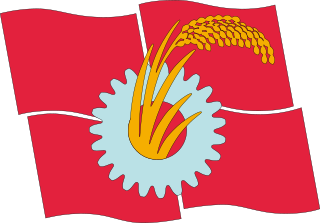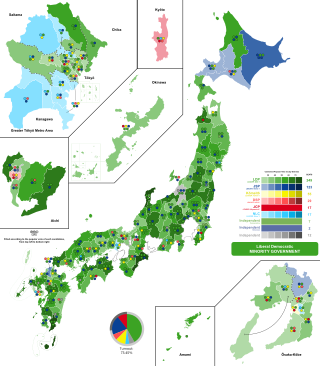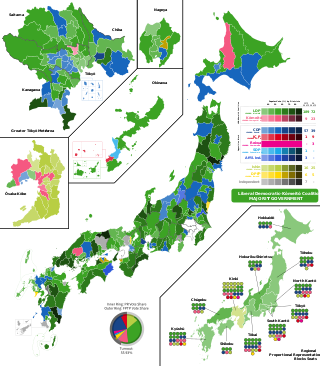
The Liberal Democratic Party, frequently abbreviated to LDP or Jimintō (自民党), is a conservative and Japanese nationalist political party in Japan.

The Japanese Communist Party is a communist party in Japan. Founded in 1922, it is the oldest political party in the country. It has 270,000 members as of 2020, making it one of the largest non-governing communist parties in the world. Kazuo Shii has been the party's chairman since 2000.

The Social Democrats is a centre-left and pro-European social-democratic political party in Slovenia led by Tanja Fajon. From 1993 until 2005, the party was known as the United List of Social Democrats. It is the successor of the League of Communists of Slovenia. As of 2022, the party is a member of a three-party coalition government with Robert Golob's Freedom Movement alongside The Left, as well as a full member of the Party of European Socialists and Progressive Alliance.

House of Councillors elections were held in Japan on 11 July 2004. The House of Councillors consists of 242 members who serve six-year terms. Approximately half the members are elected every three years. At these elections 121 members were elected. Of these 73 were elected from the 47 prefectural districts and 48 were elected from a nationwide list by proportional representation.

Democratic Labour Party of Lithuania was the renamed Communist Party of Lithuania. It was a political party in Lithuania in the 1990s, which claimed to be social democratic. The youth organization of LDDP was called Lithuanian Labourist Youth Union.

General elections were held in Japan on 5 December 1976. Voter turnout was 73.45%. This election was noted for seeing 124 newcomers win seats for the very first time, along with the defeat of some legacy candidates, signalling a generational shift in the Japanese political landscape. To date, the 1976 election has been the only post-war general election triggered by an expiration of the term of the House of Representatives; all other post-war elections have been instigated by a dissolution of the House by the Cabinet.

General elections were held in Japan on 22 June 1980. They were the result of a vote of no confidence brought by the Japan Socialist Party (JSP) on 16 May regarding corruption and rises in public utility charges as reasons for the House of Representatives of Japan to withdraw its backing from the government.

Yoshio Hachiro is a Japanese politician of the Constitutional Democratic Party and a member of the House of Councillors in the Diet.

Hachiro Okonogi is a Japanese politician who has served in the House of Representatives since 1993, representing the Kanagawa 3rd district. He also served in the Cabinet as Chairperson of the National Public Safety Commission, Minister in charge of Building National Resilience, and Minister of State for Disaster Management from 2017 to 2018. He is a member of the Liberal Democratic Party.

Seiichi Kaneta was a Japanese politician of the Democratic Party of Japan, a member of the House of Representatives in the Diet. A native of Kamiiso District, Hokkaidō and high school graduate, he joined the city government of Hakodate, Hokkaidō in 1966. After having served in the city assembly of Hakodate for four terms since 1979, he was elected to the House of Representatives for the first time in 1993 as an independent with an endorsement from the Japan Socialist Party.
Hokkaidō 2nd district was an SNTV four-member electoral district for the House of Representatives, the lower house of the National Diet of Japan, between 1947 and 1996, last used in the lower house election of 1993. Located in the prefecture (-dō) of Hokkaidō, it consisted of the cities (-shi) of Asahikawa, Rumoi, Wakkanai, Shibetsu, Nayoro, Furano and all other municipalities in the subprefectures (-shichō) Kamikawa, Sōya and Rumoi. With the return to single-member districts in the 1990s electoral reform, the district became the 7th district. In 2003 the 7th district was abolished and the area that was once the 2nd district was divided amongst the 6th, 10th and 12th districts of Hokkaidō.

General elections were held in Japan on 31 October 2021, as required by the constitution. Voting took place in all constituencies in order to elect members to the House of Representatives, the lower house of the National Diet. As the constitution requires the cabinet to resign in the first Diet session after a general election, the elections will also lead to a new election for Prime Minister in the Diet, and the appointment of a new cabinet, although ministers may be re-appointed. The election was the first general election of the Reiwa era.
This page is based on this
Wikipedia article Text is available under the
CC BY-SA 4.0 license; additional terms may apply.
Images, videos and audio are available under their respective licenses.










